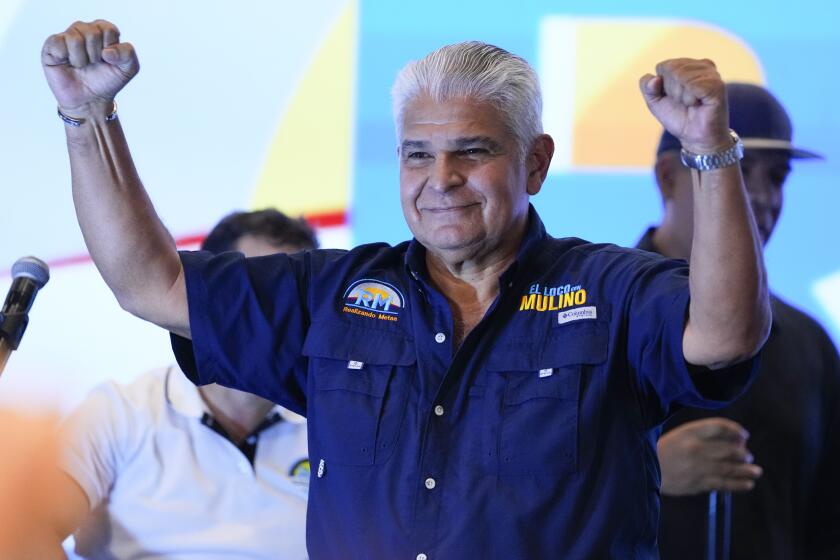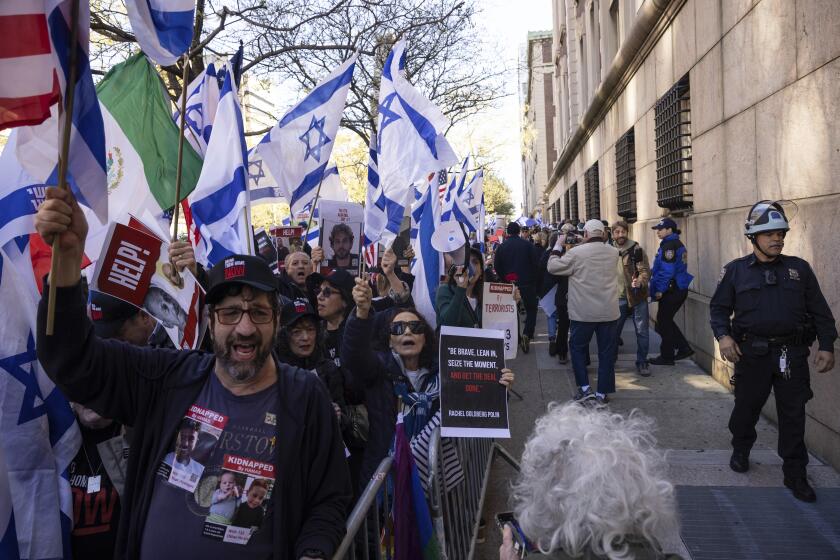Will Agree to U.S. Peace Plan, Israel Says : Diplomacy: American officials, however, say Jerusalem is insisting on conditions that have blocked the peace process for weeks.
Israel announced Tuesday that it is ready to accept “in principle” a U.S. Middle East peace initiative, but American officials said Israel continues to insist on conditions that have blocked agreement for weeks.
The Israeli Embassy in Washington said Foreign Minister Moshe Arens sent Secretary of State James A. Baker III a “positive message . . . in which he expresses Israel’s readiness to accept in principle Baker’s five points with slight modification that are needed in order to make sure that Israel’s concerns are adequately met.”
But State Department spokesman Margaret Tutwiler said Arens’ letter is no different in substance from the almost daily telephone conversations that Baker and Arens have had all month. Asked if gaps remain between the U.S. and Israeli position, Tutwiler replied: “Absolutely.”
In Jerusalem, Israeli officials said Prime Minister Yitzhak Shamir, who last week warned of a confrontation with Washington, has decided it is time to change his tone. In effect, Shamir is trying to position himself so that if the peace process breaks down, Israel will not be blamed.
“He has decided to accentuate the positive,” said Avi Pazner, Shamir’s spokesman. “The United States and Israel agree on most things and are only separated on a few points.”
Baker’s plan, which has not been made public in detail, is intended to foster a dialogue between Israel and Palestinians and to revive Shamir’s own plan for Palestinian elections in the Israeli-occupied West Bank and Gaza Strip. Baker offered his suggestions after Palestinian leaders made it clear that they would not participate in the elections under conditions proposed by Shamir last May.
The Israeli Embassy said Shamir’s government will accept the Baker approach if Israel receives assurances that it “will not be negotiating with PLO representatives” and that the Israeli-Palestinian dialogue will be limited to the election plan and will not branch off into other issues.
At first glance, the conditions do not appear to be far from the stated U.S. position. For instance, Tutwiler said last week that the United States will not try to force Israel to negotiate with the PLO. And Baker has constantly maintained that his only objective is to get Shamir’s election plan off the ground.
However, there are important differences in nuance. Under the American interpretation, the Palestinian delegation would not operate under PLO auspices but would almost certainly contain some PLO members. Washington also maintains that if Israeli-Palestinian talks start, either side should be allowed to raise any issue.
U.S. officials maintain that there is no chance that any prominent Palestinians would participate in the dialogue under Israel’s interpretation of the two points. These officials believe--although they admit they are not certain--that representative Palestinians would take part under the American interpretation.
Baker has said repeatedly that his objective is to get a peace process started.
“But, we can’t move it forward unless we can get Palestinians and Israelis sitting down at the same table and engaging each other in a dialogue,” Baker said Monday in response to a question after making a speech in San Francisco.
On Tuesday, Shamir visited Israeli soldiers on the Golan Heights and told them that the Baker plan is “still under discussion.”
“I won’t give you headlines today but promise that in a few days we’ll know if there is an agreement or not,” government radio quoted him as saying.
Kempster reported from Washington and Williams from Jerusalem.
More to Read
Start your day right
Sign up for Essential California for news, features and recommendations from the L.A. Times and beyond in your inbox six days a week.
You may occasionally receive promotional content from the Los Angeles Times.






